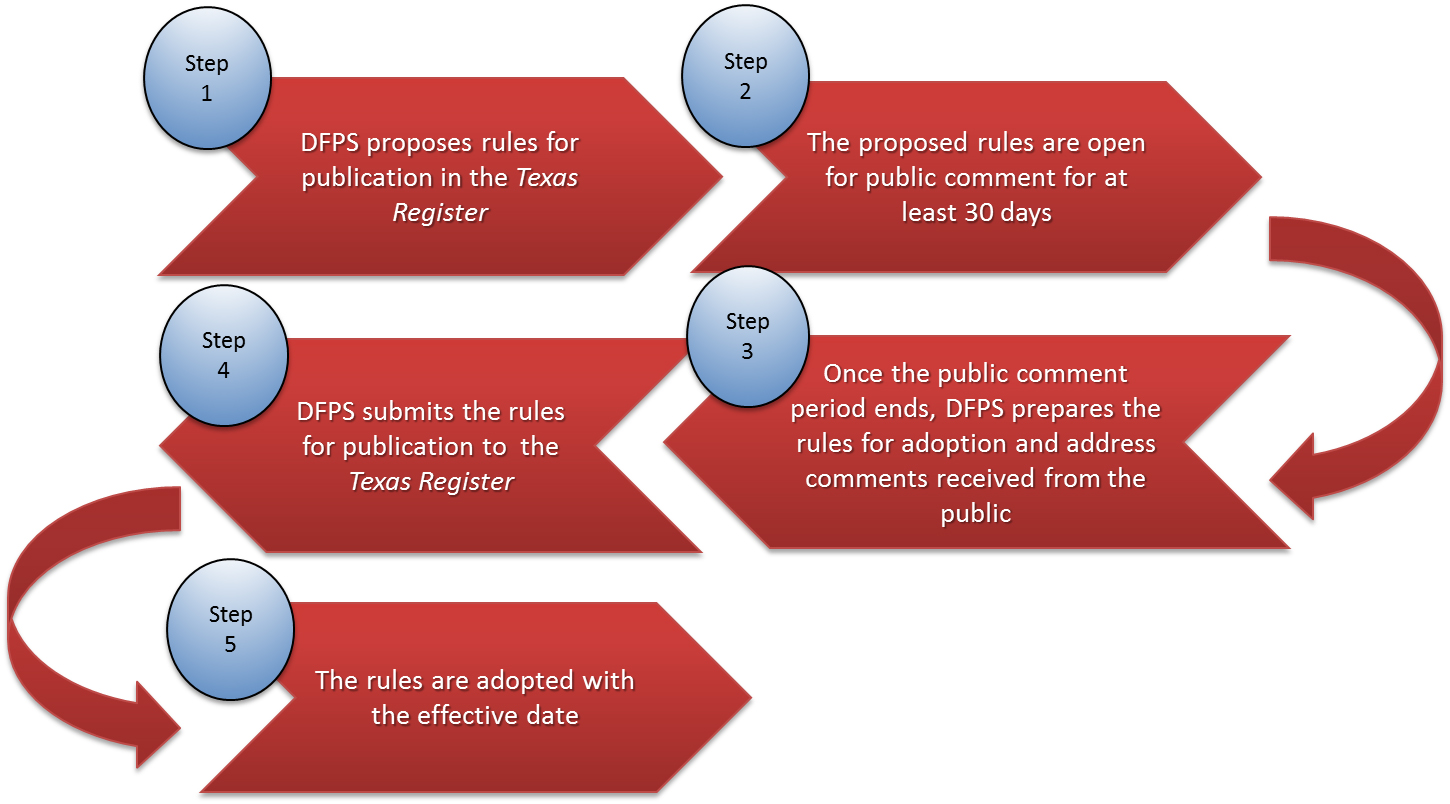What is Rulemaking?
Rulemaking is the process for developing and issuing rules. The rulemaking process can lead to the issuance of a new rule, an amendment to an existing rule, or the repeal of an existing rule.
Rules describe the procedure/practice of a state agency or other state government entity. Rules implement or interpret law and/ or prescribe policy. Rules outline policies/practices that impact the public and external stakeholders.
What is the Rulemaking Process for DFPS?
Step 1: DFPS proposes rules for publication in the Texas Register
Step 2: The proposed rules are open for public comment for at least 30 days.
Step 3: Once the public comment period ends, DFPS prepares the rules for adoption and address comments received from the public.
Step 4: DFPS submits the rules for publication in the Texas Register.
Step 5: The rules are adopted with the effective date.
DFPS Rules
DFPS proposes rules under Human Resources Code §40.027, which requires the DFPS Commissioner to oversee the development of rules relating to matters within DFPS jurisdiction and adopt rules for the operation and provision of services by DFPS. The commissioner publishes DFPS rules in the Texas Register to notify the public and allow the public to review and make comments. The public comment period begins on the date the notice is published in the Texas Register and lasts for at least 30 days. During the time that the proposed rules are published in the Texas Register, DFPS also publishes the rules below on the DFPS website. You can find the current effective rules in the Texas Administrative Code.
Proposed Rules
| Rules Project # | Subject | Section Number(s) | Contact | Publication Date | Comment Period Ends |
|---|---|---|---|---|---|
| 23R5 | Abuse and Neglect Reporting Requirements | 702.223 and 707.489 | March 29, 2024 | April 28, 2024 |
Summary
The Texas 88th Regular legislative session (2023) enacted House Bill 793 which requires DFPS to promulgate a rule requiring DFPS to reimburse a licensed or qualified provider in an amount equal to the average cost for the specific service from department contractors providing the service in the region the parent resides, from existing DFPS resources. This provision is codified at Texas Family Code §263.1021.
Chapter 263, Subchapter B of the Texas Family Code pertains to when the Department of Family and Protective Services (DFPS) has been court ordered the temporary managing conservator of a minor, and the parent, as a client is required to obtain services under a family service plan. A parent seeking services under a family service plan will be permitted to choose a licensed or qualified service provider that is not under contract with DFPS or an SSCC. Services obtained from a service provider selected by the parent must be designed to achieve the stated goals of the Family Plan of Service for a child in DFPS conservatorship and the service provider must certify whether the parent has satisfactorily completed the required service that is being sought for reimbursement. DFPS will also develop resources such as a resource guide and forms that will inform caseworkers, noncontracted service providers seeking reimbursement, and parents seeking services for their family service plan.
En Español
La 88.ª sesión legislativa ordinaria de Texas (2023) aprobó el proyecto de ley 793 de la Cámara de Representantes que obliga al DFPS a promulgar una norma que le exija al Departamento el reembolso a los proveedores con licencia o cualificados de una cantidad igual al costo promedio del servicio específico que los contratistas del Departamento prestan en la región donde resida el padre o la madre. Dicho reembolso deberá provenir de los recursos existentes del DFPS. Esta disposición está codificada en la sección 263.1021 del Código Familiar de Texas.
El subcapítulo B, capítulo 263 del Código Familiar de Texas concierne a los casos en que el Departamento de Servicios para la Familia y de Protección (DFPS) haya sido designado por un tribunal como tutor principal temporal de un menor, y el padre o la madre, como cliente, deba obtener servicios según un Plan de servicios para la familia. A un padre o madre que busque servicios según un Plan de servicios para la familia se le permitirá elegir un proveedor de servicios con licencia o cualificado que no esté bajo contrato con el DFPS o con un SSCC (contratista exclusivo para la continuidad de los servicios). Los servicios obtenidos de un proveedor de servicios que haya sido elegido por el padre deben estar diseñados para lograr las metas establecidas en el Plan de servicios para la familia para un niño que esté bajo la custodia del DFPS, y el proveedor de servicios deberá certificar si el padre o la madre ha completado de forma satisfactoria el servicio obligatorio del que se solicite su reembolso. El DFPS también deberá crear recursos, como una guía de recursos y diversos formularios, que ofrezcan información a los trabajadores sociales, a los proveedores de servicios no contratados que soliciten un reembolso y a los padres que soliciten servicios para su Plan de servicios para la familia.